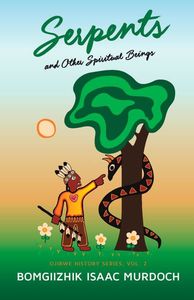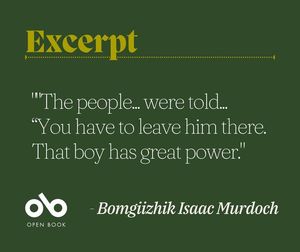Read an Excerpt from Ojibwe storyteller Bomgiizhik Isaac Murdoch's Collection, Serpents and Other Spiritual Beings
Ojibwe storyteller Bomgiizhik Isaac Murdoch's Serpents and Other Spiritual Beings (Kegedonce Press) is the second in Kegedonce Press's Ojibwe History Series, following The Trail of Nenaboozhoo and Other Creation Stories (2019). The book capture Bomgiizhik's traditional oral stories on the page, allowing readers to feel they're truly present with him. The stories appear in both Anishinaabemowin and English, with translations by Patricia BigGeorge.
Patricia Campbell, Marketing Coordinator of Kegedonce Press, recently spoke with Bomgiizhik about the book and the weight of storytelling. They've shared not only an excerpt from Serpents and Other Spiritual Beings but also what Bomgiizhik had to say about earning and "feasting" the stories:
“As a storyteller," Bomgiizhik told Campbell, "a lot of the stories, they’re earned. They’re not given to you freely. So you have to show mature behaviour, you have to follow the red path, you have to be able to demonstrate integrity and respect amongst your people.
"And often times a payment is made for the story. So a gift would be made for that knowledge. When you’re fasting and when you’re attending ceremonies and those types of things, then you’re proving yourself to be able to carry those stories for the people. So that’s all part of understanding the story.
"I also have to feast the stories as well all the time. The stories are nourished by feast plates, by putting food in the fire for them. So that they’re able to be strong and that they have the strength and endurance to be able to continue to help our people for so long. So we feast them, and we nourish the stories and all of the spirits that we talk about in the stories so that they’re able to continue to help our people through this challenging time. We need them more than ever.”
This excerpt is presented in both Anishinaabemowin (first) and English (below), courtesy of Kegedonce Press. In this story, Bomgiizhik shares the tale of a remarkable boy who dreams of the future.
Excerpt from Serpents and Other Spiritual Beings by Bomgiizhik Isaac Murdoch:
BAKEBII’IGAN BEZHIIG
Misi-ginebek Neyaashing
Mewinzha ikidowad, iwi oshkininis, An-ishinaabes o’o, ogii’izhi nawaad ima waawen-daag igoshimowa’yan, jimakadekewin, i’iwidi Shkoodeyiing minis ezhinikaade. Mi’iwidi gaa-izhi’ined j-imakadekewin a’ii ji-naagwe’idizowin ogodinaan wiineta bawaajigan gaye miinigoo-wiziwin
Apii megwa gii’igoshimod, gegoo gi’izhise. Igiwi anishinaabeg gaa-izhinawad gi wiinda-maagowiziweg “Migo iwate onji- iganiganawaa. Mi’iwi oshkininis otayaan giji-minigozi mani- tooke gaye wiinigo dibi-giiwe. Gawiin gaa naaz-ko’ise”
Mi’iwi oshkininis, ashi niizh-bibone, mi’iwate minising gii’nagana. Shkoodeyiing wiineta. Giwiindamaa’aag gawiin azhegiiwesiim gawiin gaa naazko’ise. Misa, iwate namadabi endaso-giizhik. Gawiin miijim, gawiin nibi, gaawiin gegoo. Wiin gii-gikinaamowa ji- anami’aa iwi win jii’igoshimowin, midash ga-izhichiged.
Gegapii , giji giishkaabaagwe gaye bebengwani-yeg, bakaakadwaa’odengwaan. Wegonen igo gagwaizhijige wii’maajaa iwi minis. Gi’ikido’oog gibazigwiid gimaajaa gagi’abid, wenji ogikendaan gegoo wimaazhise.
Your CanLit News
Subscribe to Open Book’s newsletter to get local book events, literary content, writing tips, and more in your inbox
Gibimose agamiing onawaabidan gitakmaigaang, ginawaabi igo maamakaadedam wegonen dash anishinaabeg gaa maajaawaad. Mi’iwidi geba-dibik abid, jiigibiiskaa iwidi. izhaa iwedi (gawiin niin iwi oshkininis), gii zhaa iwidi ozaam wiikoshkaagon iwi dibaajimowin
Iwi oshkininis jigibiing gi’iizhaa jiigibiing, mii’imaa ginibaa jigibiing. Ingo-dibik bawaajige. Gawiin eta bawaajigan idash gaye onwaachigewin waagonen gaa izhiwebizeg, ogiwaabandan,wii’ani-akiiwang awaajigewin.
Obawaajigewin, miitaawangang inaabi, endash zaagaakosin makade ozowns imaa mii-taawangang, mamaajise, migo gii’aabe waaban-dang. Gezika iwaa ozowens michaase, idash mii-taawang gaye mamaajise miinawaa igo mamajise. Migo gi’aabe giinowaabandang iwaa obwaajigeniing.
Gezika mookii makade ginebekoons, idash iwi ginebek wendamawan: “Goshkozi’in beedaa-bang, miitaawangang ige inaab. Agibi-indaakoojige imaa
Gaa ezhi biindaakoojigeyan, gabi’naazikowa. Igi waabidan miitaawang daa maaji ditibise, mi’idash gaa waabimin iwedi.” I’i oshkininis mii’ bijiinag goshkozid idash mooga’ang biijinag, giji’amigad apii, apiji mashkawayaa api ezhi giizhig.
Gibi mooga’ng mii’ zhemaag maaji waabidang o’o miitawaang. Gibiindaakoonige, odaa ase-maman, migo nasab gikinoo’amaa o’bwaajigan. Moozhag igo ima namadabi migo gino waabidang iwi mitaawang. Gawiin gegoo izhise-noon. Magizhaa ditibise gi’inendaam. Ezhi basangwaabid maaji gagnoonaad iwi anamaka-miing. Gikido “Nii’ayaa ima! Niin awe oshkininis gaganoozh dibikong Nii’ayaa ima! Mii’ima geizhi nibowin; Ninenandan wiji’ishiin. Daga bizhaan ayaa’an.
Gezika, iwi mitaawang maaji gizhebaatite nana’akaaj. Owaabidan iwi ozowens mookiseg gaa ezhiise igo obawaajigan. Gawiin ji deb-weyendang! Iwe maajii-ditibise giyaabi igo ditibise mino waa ditibise. Geg aapii, makade ginebekonz, makade mnidooawaash, mookiid imaa mitaawangang
Iwi makade ginebekoonz owaabimigoon mi’idash ji- widamowad: “Ingii-noondoon Gibi-indaakoonigen, Omaa daa ayaa, Nadawenimin jibisangwaabi’in ,mii’ ga bagosenjige igiwe wiiji aa’aag... ozaam gii-giji-zanagak bi’ayamagad. Izhi- boaosenjige’an, giji-bagosenjige’an, gaa nmin-did. Awashime giyaai bagosenjige’an migo noowaaj gaa ini mindid.
Misa, gizhichigad iwi oshkininis. Gimaaji ba-gosenjiged
igo bagosenjiged, maaji bagosen-jigedamaw wiiji aa’aag, mii’iwe gii-giji-zanagak gaa bi ayamagad. Iwi misi-ginebek ginwaabiigizid, misa giji min-dido! Gawiin ogikendaziin owaananidbiigizid ozaam gibazengwaabi. Dash inaabid ayaa ima giji misi-ginebek shigishin iwe jiigibiig, niim-idana ginwaabigizi, giji eshakanan!
Ini eshakanan mashkwaa’igan, inaadiziwin gikendamowin. Iwe misi-ginebek oginawaabima ino gwiizensan izhi ikido, “Giji-inenimin. Nigii-wewinan. Gwashkonin ima nipickwan, minjimi-inan nieshkanan! Ga aashoogwinin ide Ne-yaashiing, neyaashi.”
Iwi oshkininis gwaashkwaini ima misi-ginebek opikwanang, minjimaakwid ino eshkanan, mii’iwe misi-ginebek aashawa’inad iwedi Ne-yaashiing. Ga izhi bagidinend o’o oshinnins ezhi ikido, “Niin Ginebig, Niin iwi ginebek. Niin genawendaan inowaan nibi’. Gii miizhiwin iko gaa daa asema gaa minomanji’o. Apane gikendan imaa a’yaan, apane gikendan gibi-indaakoojige’yan.”
~
CHAPTER ONE
Serpent's Point
They say that years ago there was a young boy, little Anishinaabe, they went to go put him on a sacred fast, a vision quest, at a place called Shkoodeyiing, the Place of Fire is what that island is called. They put him out to fast there so that he could get his vision and get his power.
During his fast, something happened. The people that were going to put him out were told spiritually by something, “You have to leave him there. That boy has great power, and he can make his way back. Don’t go get him.”
So that little boy, he’s only like twelve years old, was left on that island, Shkoodeyiing, by himself! They were told not to go back and get him. So, he sat there day after day after day. No food, no water, nothing. He was just instructed to pray for his vision so that’s what he did.
Finally, he got so thirsty and dehydrated, his face just sucked right in! He was ready to do whatever he could to get off the island. They say that he got up and left his spot, because he knew something was wrong.
He walked to the shoreline looking at the mainland, just staring at it wondering why his people left. So, he spent the night there, there’s a little beach there. I have been there (no I wasn’t the little boy), I went there because I was fascinated by the story.
The little boy goes to the beach, he sleeps on the beach. That night he had a dream. Not only a dream but he had a prophecy of what was going to happen, onwaachigewin, he’s seen the future in his dream.
In his dream he looked into the sand, and he saw a little black tail sticking out of the sand, it was moving around, and he kept staring at it. All of a sudden that little tail started to get bigger, and the sand started to move around and around. He just kept staring at it in his dream.
All of a sudden a little black snake emerged, and that snake told him: “When you wake up in the morning, I want you to come look in the sand. Put some tobacco there.”
“Where you put the tobacco, I’ll come for it. You will see the sand start turning around, and I’ll see you there.” The boy just woke up and of course the sun was just coming up, that’s a very powerful time of the day.
The sun was just coming up and right away he started to look in that sand. He put asemaa there, his tobacco, just like he was instructed in the dream. He sat there for a long time and stared at that sand. Nothing happened. It didn’t start to twirl around like he thought. So, he closed his eyes and he spoke to that ground underneath. He said “I’m here! I’m the little boy you spoke to last night. I’m here! I’m going to die here; I need your help. Please come to me!”
Suddenly, that sand started to move around very slowly. He could see that little tail come out just like in his dream. He couldn’t believe it! That thing just started to go around and around and around. Finally, a little black snake, a little black mnidooawaash, came out of the sand.
That little black snake looked at him and told him: “I heard you. You put your tobacco down, I’m here. I want you to close your eyes and I want you to pray for your people... because hard times are coming. As you pray, the harder you pray, the more that I’ll grow. The more that you pray for your people the bigger I’ll get!”
So that’s what the boy did. He started to pray, and pray, and pray for his people, for the hard times that were going to come. That Serpent started to grow, it got real big! He didn’t even know how big it was because his eyes were closed, but when he opened his eyes there was a great big serpent laying on the beach, forty feet long, great big horns!
Those horns are very powerful, they represent knowledge. That serpent looked at that boy and said, “I’m very proud of you. I will take you back home. Jump onto my back, hold onto my horns! I’ll take you across to Neyaashiing, the point.”
The little boy jumped onto the Serpent’s back, held onto those horns, and the Serpent took him across to Neyaashiing. It dropped the boy off and said, “I’m Ginebig, I’m the snake. I am the guardian of these waters. When you gave me your tobacco it made me feel good. Always know that I’m here, always know that I’m watching.”
__________________________________________________
This excerpt is taken from the book Serpents and Other Spiritual Beings by Bomgiizhik Isaac Murdoch, published by Kegedonce Press. Copyright 2022 © Bomgiizhik Isaac Murdoch. Reprinted with permission.
Bomgiizhik (Isaac Murdoch) is from Nimkii Aazhibikoong First Nation. He is of the Fish Clan and is Ojibwe. He has four beautiful children. He currently lives in the forest at Nimkii Aazhibikoong, an Indigenous community that focuses on Indigenous language, art, and land based activities. Being blessed with the opportunity, Bomgiizhik grew up in the traditional setting of hunting and gathering on the land. Having spent many years learning from Elders, he spends a lot of his time as a Story Teller. Many of these stories become his visual art pieces which have become recognized world wide. Bomgiizhik is also a Singer Song Writer who loves to make music when ever he gets a chance. You will often find him on the land looking at his favourite plants or gazing into the beautiful night sky.
Bomgiizhik (revolving Sky) Nimkii Aazhibikoong njibaa. Giigoonhan doodeman. Ojibwe aawi. Niiwin gwenaajiwinjin wdaansan wda’aawaan. Nongo megwaa daa mtigwaakiing. Nimkii Aazhibikoong, Nishinaabekiing enaagdoot Nishinaabemowin miinwaa mzinbiigeng, ngoj-go-gegoo baa nankiing maakiing. Aapji gii-mnaabewzi, Bomgiizhik gii-bi-kogid, ghkendangwaa zhi-nishnaabe maadzid, gi-giiwse, gii-zgaktaaso, gegookiing edinang.Aashi gaa-bi-kenoomaagzid getsinjin gii-bi-ghkendmaad niibna nso-boon, miinongo maanda enakiid, aadsookewnini aawi. Niibnaa go kinda dbaajmowininan gashtoonanwii-mzinbii’ang ezhiwaambdvng, miidash gonda mzinbiiganag kina mziwi king ewaambjigaazjig. Bomgiizhik ge’e ngomwinan ezhtoojindo-ngamnan, miinwaa doo-zhibii’aanan. Aapji go bishgendaan maandqa nankid, pii gwa zhised. Naangodnong syaakyoojin waawaaskoneyan maage datganaabit oodi gnawaambdang gwenaajwinik, gwenaajwang dibik giizhik.





